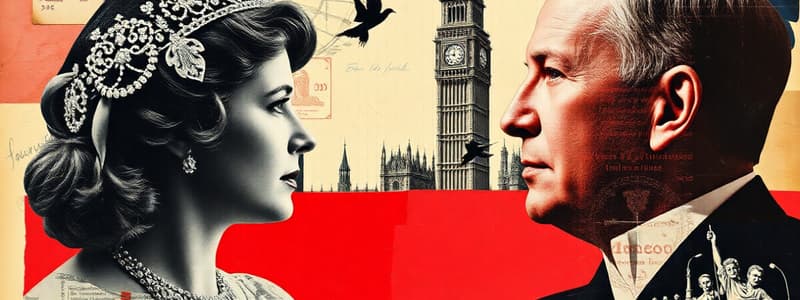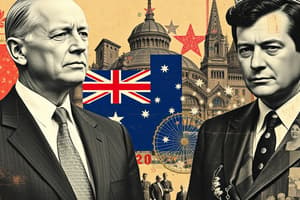Podcast
Questions and Answers
What is the primary characteristic of a constitutional monarchy as exemplified by the UK?
What is the primary characteristic of a constitutional monarchy as exemplified by the UK?
- The monarch can amend laws without the input of parliament.
- The monarch represents a single political party.
- The monarch's power is ceremonial and legislative power lies with elected officials. (correct)
- The monarch has complete control over the government.
In Cuba, citizens are allowed to criticize the government freely.
In Cuba, citizens are allowed to criticize the government freely.
False (B)
What is the role of the House of Commons in the UK?
What is the role of the House of Commons in the UK?
It is the elected chamber of Parliament that holds the majority seats.
In a __________ state like Cuba, the government controls all education and the economy.
In a __________ state like Cuba, the government controls all education and the economy.
Match the government types with their characteristics:
Match the government types with their characteristics:
What type of government system does Cuba have?
What type of government system does Cuba have?
The House of Lords in the UK is an elected body.
The House of Lords in the UK is an elected body.
What significant change occurred in Cuba in 1965?
What significant change occurred in Cuba in 1965?
The Monarch in the UK is a national symbol for __________, unity and pride.
The Monarch in the UK is a national symbol for __________, unity and pride.
What is a common feature of socialism?
What is a common feature of socialism?
Which group is NOT allowed to stand as a political candidate in an election?
Which group is NOT allowed to stand as a political candidate in an election?
Members of the House of Lords are allowed to stand as political candidates.
Members of the House of Lords are allowed to stand as political candidates.
What is the total number of seats in the House of Commons?
What is the total number of seats in the House of Commons?
The Conservative Party had _____ MPs in January 2019.
The Conservative Party had _____ MPs in January 2019.
Match the following political parties with the number of MPs they had in January 2019:
Match the following political parties with the number of MPs they had in January 2019:
What type of agreement is needed for a minority government to retain power?
What type of agreement is needed for a minority government to retain power?
The Democratic Unionist Party (DUP) agreed to support the Conservative government after the 2017 election.
The Democratic Unionist Party (DUP) agreed to support the Conservative government after the 2017 election.
What increased spending budget did the DUP receive for Northern Ireland?
What increased spending budget did the DUP receive for Northern Ireland?
Those subject to _____ restrictions are not allowed to stand in elections.
Those subject to _____ restrictions are not allowed to stand in elections.
Which political party has the least number of MPs?
Which political party has the least number of MPs?
What was a significant event that contributed to women's suffrage in the UK?
What was a significant event that contributed to women's suffrage in the UK?
The Conservative Party primarily supports policies that reduce the role of private companies in public services.
The Conservative Party primarily supports policies that reduce the role of private companies in public services.
Who were the main organizers behind the Suffragette movement?
Who were the main organizers behind the Suffragette movement?
The main supporters of the Labour Party include trade union members and __________.
The main supporters of the Labour Party include trade union members and __________.
Match the following political concepts with their descriptions:
Match the following political concepts with their descriptions:
Which group of people were historically excluded from voting in the UK until after World War One?
Which group of people were historically excluded from voting in the UK until after World War One?
In 2019, Scotland was the first part of the UK to lower the voting age to 16.
In 2019, Scotland was the first part of the UK to lower the voting age to 16.
What system of voting allows citizens to make decisions directly?
What system of voting allows citizens to make decisions directly?
Members of the House of Lords __________ vote in UK elections.
Members of the House of Lords __________ vote in UK elections.
What was the average range of candidates for each constituency in the 2017 General Election?
What was the average range of candidates for each constituency in the 2017 General Election?
Flashcards are hidden until you start studying
Study Notes
Constitutional Monarchy
- The UK has a ceremonial head of state, the monarch, who performs constitutional and representational duties
- The UK Parliament, comprising the House of Commons and the House of Lords, holds legislative power
Parliamentary Democracy
- The UK government is formed by the winning party in the House of Commons
- The government is accountable to Parliament
- The UK has a bicameral system (two chambers) with an elected House of Commons and an unelected House of Lords
Communism
- Cuba adopted communism in 1965 under Fidel Castro
- The government controls all public services, property, and businesses
- There's only one allowed political party – the Communist Party
- Opposition parties are illegal, and freedom of speech and press is restricted
Types of Government
- Communism: Advocates for a classless society with equal sharing of resources
- Socialism: Favors profit sharing, worker protection through trade unions, and a strong role for the people in decision-making
- Capitalism: Emphasizes free market forces, low taxes, and individual reward based on hard work
- Liberalism: Proponents of democracy, individual rights, and government serving the people
- Conservatism: Favors a strong, stable government and business regulation
- Fascism: Advocates for nationalistic and autocratic leadership, with the country´s interests above individuals
- Anarchism: Rejects rules and authority, promoting individual freedom and direct democracy
Direct Democracy
- Citizens directly make political decisions
- Ancient Athens practiced direct democracy through citizen assemblies
- Modern Examples: referendums
Saudi Arabia
- Saudi Arabia is an absolute monarchy
- The monarch holds all power, with no checks and balances
- Monarchy can lead to less corruption but citizens have limited control
UK Suffrage Movement
- Women's suffrage movement campaigned for women's right to vote
- Women played a significant role in World War I, serving as nurses, drivers, and secretaries
- Women's suffrage was granted in 1918 through the Representation of the Peoples Act
Voting Restrictions in the UK
- House of Lords members, prisoners, the mentally incapable, those under 18, foreign citizens, election crime offenders, and the royal family cannot vote
2017 General Election
- No party gained a majority, leading to a Conservative-DUP confidence and supply agreement
- The highest turnout in a UK general election since 1997 was 69%
Conservative Party
- Founded on values of individual responsibility and limited government intervention
- Key supporters include business owners, landowners, and residents of rural areas and southern England
Labour Party
- Established by trade unions to represent working-class interests
- Strong support among trade union members, younger people, and residents of Northern England
- Primary policy is to reduce inequality and create jobs through public spending
2017 General Election Statistics
- 285,000 UK citizens abroad registered to vote
- 48,853,433 people registered to vote
- 284,000 proxy votes cast
- 8,412,060 postal votes issued; 7,155,315 votes cast; 2.4% invalid votes
- 74,289 spoiled ballots
Excluded from Political Candidacy
- Royal family members, armed forces personnel, House of Lords members, police officers, civil servants, judges, and individuals under bankruptcy or debt relief restrictions
House of Commons Composition (January 2019)
- Conservative: 317 MPs
- Labour: 256 MPs
- Scottish National Party (SNP): 35 MPs
- Liberal Democrat: 11 MPs
- Democratic Unionist Party (DUP): 10 MPs
- Independent: 8 MPs
- Sinn Fein: 7 MPs
- Plaid Cymru: 4 MPs
- Green Party: 1 MP
- Speaker: 1 MP
- Total: 650
Confidence and Supply Agreement
- The DUP agrees to support the Conservative Party in critical votes in exchange for increased Northern Ireland spending.
Studying That Suits You
Use AI to generate personalized quizzes and flashcards to suit your learning preferences.




